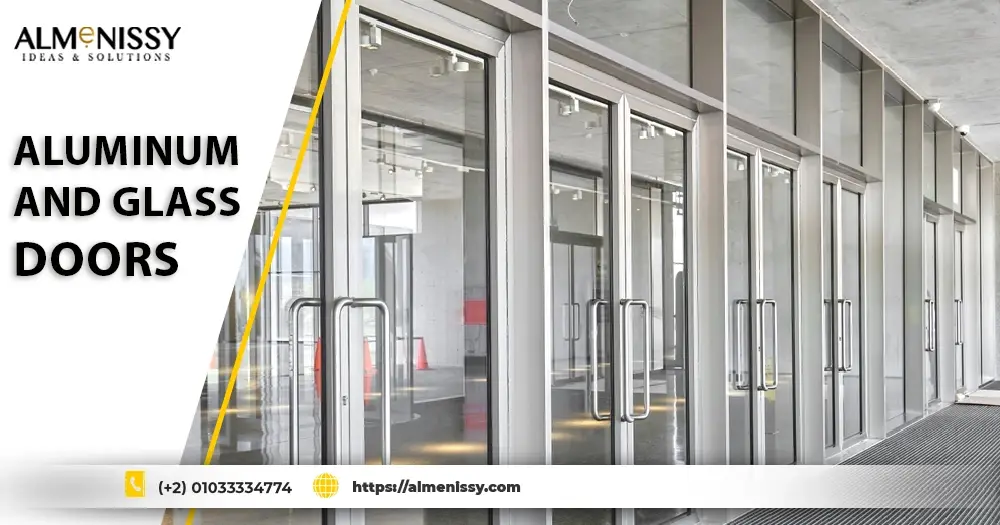Aluminum and glass doors have become increasingly popular in both residential and commercial architecture due to their sleek, modern aesthetic and practical benefits. Aluminum, known for its strength, durability, and resistance to corrosion, provides a robust framework that can withstand the elements and daily wear and tear. Glass, on the other hand, offers a sense of openness and transparency, allowing natural light to flood interior spaces and create a seamless connection between indoor and outdoor environments.
Together, aluminum and glass doors combine form and function, offering a versatile solution that enhances both the visual appeal and functionality of any building. Their minimal maintenance requirements and energy efficiency further add to their appeal, making them a preferred choice for contemporary design.
Table of Contents
What is aluminum and glass doors?
An aluminum and glass doors is a type of door that combines a frame made of aluminum with one or more glass panels. The aluminum frame provides strength, durability, and resistance to corrosion, making it ideal for various weather conditions and long-term use.
The glass panels allow for natural light to enter and offer a clear view, enhancing the aesthetic appeal and creating a sense of openness in the space. These doors are commonly used in both residential and commercial settings for their modern look, low maintenance requirements, and energy efficiency.
What type of glass is used for aluminum doors?
In addition to aluminum and glass doors. The types of glass commonly used for aluminum doors include:
- Tempered Glass: Also known as safety glass, it is heat-treated to be much stronger than regular glass.
- Laminated Glass: This type consists of two or more layers of glass with an interlayer of polyvinyl butyral (PVB) or ethylene-vinyl acetate (EVA). It holds together when shattered, providing additional safety and security.
- Insulated Glass Units (IGUs): These are double or triple-glazed glass panels with a space in between filled with air or inert gas, improving thermal insulation and energy efficiency.
- Low-E Glass: Low-emissivity glass has a special coating that reflects infrared and ultraviolet light, helping to keep interiors cooler in the summer and warmer in the winter while reducing energy costs.
- Frosted or Tinted Glass: These provide privacy while still allowing light to pass through. Frosted glass has a milky appearance, while tinted glass has a color or shade added to it.
- Soundproof Glass: Often used in areas requiring noise reduction, it usually combines laminated glass and IGUs to minimize sound transmission.
These types of aluminum and glass doors offer different benefits and can be chosen based on the specific needs of the door’s application.
What are the advantages of aluminum doors?
Aluminum and glass doors offer several advantages, including:
- Durability: Aluminum is resistant to corrosion and rust, making it highly durable and suitable for various weather conditions.
- Low Maintenance: Aluminum doors require minimal upkeep compared to wood or steel doors, as they do not warp, crack, or need frequent painting.
- Strength: Despite being lightweight, aluminum is strong and can support large glass panels, providing both structural integrity and aesthetic appeal.
- Energy Efficiency: Modern aluminum doors often feature thermal breaks and can be paired with insulated glass, enhancing energy efficiency and helping to maintain indoor temperatures.
- Design Flexibility: Aluminum can be easily shaped and customized, allowing for a wide range of designs, finishes, and colors to suit various architectural styles.
- Sleek Appearance: Aluminum doors have a contemporary, slim profile that complements modern design trends and maximizes natural light.
- Environmental Sustainability: Aluminum is recyclable, making it an eco-friendly choice for sustainable building practices.
- Security: Aluminum doors can be fitted with robust locking mechanisms, providing enhanced security for residential and commercial properties.
These advantages make aluminum and glass doors a popular choice for both residential and commercial applications.
Aluminum and glass entrance doors
Aluminum and glass doors are a popular choice for both residential and commercial buildings due to their modern appearance, durability, and functionality. These doors typically feature a strong aluminum frame combined with glass panels, providing a sleek, contemporary look while allowing natural light to enter the space. aluminum and glass doors combine functionality, security, and style, making them an excellent choice for modern buildings.
Conclusion
In conclusion, according to Almenissy company, aluminum and glass doors represent a sophisticated blend of durability, aesthetic appeal, and functionality. Their robust aluminum frames provide long-lasting strength and resistance to environmental factors, while the glass panels enhance natural light and offer an elegant, modern look.
Ideal for both residential and commercial spaces, these doors not only improve energy efficiency but also require minimal maintenance, making them a practical and stylish choice for contemporary architecture. As a result, aluminum and glass doors continue to be a popular choice for those seeking to elevate the design and performance of their buildings.
FAQ
How thick is aluminum glass door?
The thickness of aluminum glass doors varies based on the design and application. The aluminum frame typically ranges from 1.5 to 2.5 inches (38 to 64 mm) in thickness. The glass panels can vary as well: single glazing usually ranges from 1/8 inch (3 mm) to 1/4 inch (6 mm), while double glazing (Insulated Glass Units) combines two glass panes, each typically 1/8 inch (3 mm) to 1/4 inch (6 mm) thick, separated by a spacer for improved insulation. The overall thickness of the door depends on these factors and the specific requirement.
What is the best way to select an aluminum and glass doors?
The best way to select aluminum and glass doors involves considering several key factors, such as; Purpose and Location, Design and Aesthetics, Durability and Maintenance and Energy Efficiency. Considering these factors will help you select aluminum and glass doors that meet your aesthetic, functional, and financial needs.


